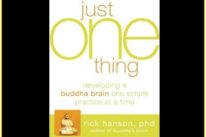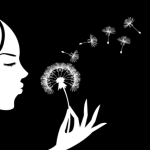
I began practicing yoga and meditation in 1970 when I was seventeen years old.
I practiced in my small bedroom at one end our family’s long New York City apartment. My room was next to the kitchen. My parents, brother, and sister had bedrooms on the other side of the apartment.
I’d get up early and move through a sequence of yoga asanas before sitting down to meditate.
I’d sit in meditation until I heard the kitchen noises as my mother and siblings began their breakfast routine.
That was the signal that it was time for me to move from my “cave” into my “world.” After bringing my palms together, I’d start my daily experiment.
My bedroom was separated from the kitchen by an eight-foot long hallway. And I’d observed, over the weeks of practicing, that the inner experience of peace and balance that had been cultivated in meditation would rapidly degrade as I made my way along that short hall.
Even though I wanted to maintain the yogic feeling, as I took each step my inner peace fragmented.
As I moved down the hall, my body would tighten. Shoulders and belly tensing instinctively as I approached the family breakfast table. Step-by-step, yogic equanimity was replaced with the persona of a moody, too-cool-for-school teenager.
Those states of balance and equanimity were no match for my reactive conditioning.
I didn’t have the capacity to sustain compassion and detachment while engaged in my family relationships. But I could develop it through daily deepening spiritual practice. And so can you.
Meditation practice does change your life. Through daily practice you literally rewire your brain and develop new relationship with your life.
Studies conducted by Harvard-affiliated researchers at Massachusetts General Hospital (MGH) using magnet-imaging have shown that in as little as eight-weeks of practice new mediators can dramatically strengthen the brain structures associated with self-awareness, compassion, and introspection.
It’s remarkable how a simple meditative practice can transform something as basic as brain structures.
But these brain structures won’t strengthen themselves. You need to do something to develop these new neural networks.
What you do and how you do it matters. Because you can’t force or bully your brain into transformation. Bullying isn’t a spiritual practice. It’s self-punishment.
The reactive patterns won’t transform under threat of punishment. Being hard on yourself, demanding change—all forms of self-punishment only strengthen the reactive patterns.
One part of your being—the part you may think of as “you”—demands change. The other part—which you may think of as “my anger” or “my confusion” or “my eating,” the list goes on—resists change.
The pattern that you’re trying to change won’t respond to strong-arm tactics.
Transformation isn’t a matter of will power.
When you push, aggressively, against the pattern, it’s going to react, pull back, contract; and your life will stay locked in the same reactive cycle of thought, emotion, and behavior that diminish your creativity, meaning, and joy.
Meditation builds your capacity to embody compassion and detachment.
First toward the reactive patterns of your own body/mind and then toward the rest of your world. It builds the neural networks, the emotional resilience, and the self-awareness that expands your choices and opens your possibilities.
As I walked towards the breakfast table, it seemed like I had no choice but to be…teenage-Eric.
The expansive, undefended consciousness that I discovered through yoga and meditation didn’t seem to have a place at the breakfast table. I was face-to-face with my need to develop greater capacity.
Forty years later I can look back on my situation with compassion, detachment, and a bit of humor.
You can do the same for situations and conflicts that you have “outgrown” or balanced. With the distance of time and the perspective of maturity you can look back with detachment and compassion.
You can see where you were caught because you’re now free from that pattern of reactivity. But what about your current situation?
What are the reactive patterns that limit you today?
What are the reactive patterns that get triggered by certain people, voice tones, words, and situations?
Here’s the truth: In forty years you’ll be able to look back at your current reactivity and smile. You’ll be able to think back to what triggers you today with detachment, compassion, and a bit of humor. But why wait for the calendar pages to turn?
You can turn within, through meditation, and tap into that same compassion, detachment, and loving humor—right now.
This isn’t just a mental trick. It’s not imagination.
Neuroscientists can see and measure the changes that meditation produces. It’s not about pretending that you don’t care or that you’re not being triggered. It’s not about belief.
It’s deeper and more embodied than that.
You don’t have to wait forty years to look back at your situation with detachment and compassion.
You can strengthen the neural networks that support self-awareness, compassion, and emotional resilience now.
There is a state of wisdom and love within you now. By turning the light of awareness within and opening your mind and body to that light, you can let go of reactive patterns naturally.
Through meditation you build your capacity to witness, experience, and bless the patterns of reactivity that have been conditioned into your body/mind. You build your capacity to embody balanced being in the face of reactivity.
You can do this by taking three minutes to do the following:
- Sit still with your eyes closed.
- Be aware of your breath.
- Bring to mind something beautiful, like a flower or a sunset.
- As you breathe in imagine that you are breathing the beauty of that flower into your mind and body.
- Feel the beauty spreading through your nervous system.
That simple practice of breathing in beauty, practiced for a few minutes a day, will rewire your brain and organically free you from the patterns of reactivity.
Then, whether you’re walking to breakfast or a business meeting, facing a difficult conversation or a chocolate brownie, you won’t be overwhelmed by reactivity.
You’ll have the inner capacity, the neural networks, and self-awareness to bring mindfulness and compassion to yourself and the situation.
Photo by Hartwig HKD
About Eric Klein
Eric Klein is the co-founder of http://www.wisdomheart.org. He offers the online trainings The Meditation Habit, Healing Family Karma, and other Wisdom Heart programs. He is also the creator of http://www.dharmadoodles.com.













 Though I run this site, it is not mine. It's ours. It's not about me. It's about us. Your stories and your wisdom are just as meaningful as mine.
Though I run this site, it is not mine. It's ours. It's not about me. It's about us. Your stories and your wisdom are just as meaningful as mine.